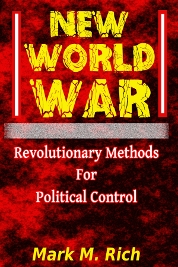Main Menu
Updates
-
Update: December 22, 2025
No Book Reviews....more - Important Updates
- Previous Updates
- Attack Log
Donations
- I accept cryptocurrency & PayPal
Available Books
New World War: Revolutionary Methods for Political Control
Dedication & Thanks
Volume I: Current Political Situation
- Overview
- Introduction
- Revolution in Warfare
- The Other World
- Dictatorship Creation
- The Groups Facilitating the Revolution
- Their Goal is Neo-Feudalism
- Problem-Reaction-Solution
- Volume I Commentary
Volume II: The New War
- The New War
- The New Enemy
- Initiatives to Remove Civil Liberties
- The Investigation
- Surveillance Technology and Methods
- Mind-Reading
- Volume II Commentary
Volume III: Weapons of The New War
- Introduction to Nonlethal Weapons
- Psychological Operations
- Introduction to Directed-Energy Weapons
- High-Powered Microwaves
- High-Powered Lasers
- Sonic Weapons
- Computer Network Operations
- Microwave Hearing
- Silent Subliminals
- Use of Citizen Informants
- Chemical and Biological
- Weather Warfare
- Miscellaneous Weapons and Tactics
- Volume III Commentary
Volume IV: The Coverup
- Volume IV Introduction
- Schizophrenia Spectrum Disorders
- Control of the Medical Industry
- Another Look at Schizophrenia
- Political Considerations
- Punitive Psychiatry in Communist Russia
- Coverup Initiatives
- Volume IV Commentary
- Conclusion
Appendix
- A Brief History of PsyOp
- Small-Scale Wars
- Nongovernmental Organizations
- Human-Computer Intelligence Network
- Electronic Tyranny
- Other Devices Connected to the GIG
- My Experience
- Sources
Other Sites
Nongovernmental organizations (NGOs) are also known as grassroots organizations, transnational social movement organizations, private voluntary organizations, self-help organizations, independent sector, volunteer sector, civic society, and nonstate actors. Amnesty International, the largest human rights organization in the world, is an example of an NGO. Others include the World Social Forum, Oxfam, World Vision, and Doctors without Borders.
NGOs address issues pertaining to the environment, religion, emergency aid, or humanitarian affairs. They are involved in education, technical projects, public policy, relief activities, and developmental programs. Their capability, equipment, resources, and expertise can vary from one to another.
Some have decades of global experience in developmental and humanitarian relief procedures. Others are small organizations which are dedicated to a particular emergency or disaster. They are viewed by some as beneficial entities which provide services that the for-profit private sector and governments do not.
There are a variety of ways in which NGOs can be classified, including public, private, religious, etc. But the two basic types are advocacy and operational. An advocacy NGO exists to defend or promote a specific cause. They promote these causes by working with the press, lobbying, and other activities. An operational NGO exists mostly for developmental projects. They mobilize public support and contributions for projects and often have strong links in the community.
The term NGO has no legal status. Most are created as trusts, foundations, nonprofit, or other entities. The term NGO originally meant that the organization was created and run by people without the participation or representation of any government. It was first used in 1945 with the establishment of the United Nations.
NGOs were created as a solution to the imperialistic measures of international organizations and the resulting turbulence caused by globalization. However, some contend that NGOs are used by these wealthy elites to replace true grassroots movements.
Large NGOs have budgets in the many millions or even billions of dollars. Some sources of funding include: membership dues, sale of goods and services, grants from international institutions, grants from governments, and private donations. Although the governments of the countries which an NGO is registered in may require some oversight, the funding sources may not be publicly available.
Despite the term “non-governmental,” many of the larger NGOs are in fact state and corporate funded. Some are managed with a professional staff, and exist to further the political or social goals of their funders. They are able to maintain their nongovernmental status by not employing members of a government.
NGOs are accepted as legitimate groups in the international community. They significantly influence both national and international policy. Their political influence extends down to the local level. Many international NGOs consult with the UN relevant to their area of expertise, and serve a critical role in upholding UN treaties.
A related group is an intergovernmental organization (IGO), which is formed by an agreement between two or more governments on a regional or global basis. They reportedly exist for stabilization and humanitarian efforts. The UN is considered to be an IGO. These groups may be created for general or specialized purposes. NATO and the Organization for Security and Cooperation in Europe are specialized security organizations. The World Food Program is also a specialized IGO. The African Union and the Organization of American States are general IGOs. IGOs work closely with NGOs and interagency partners.






